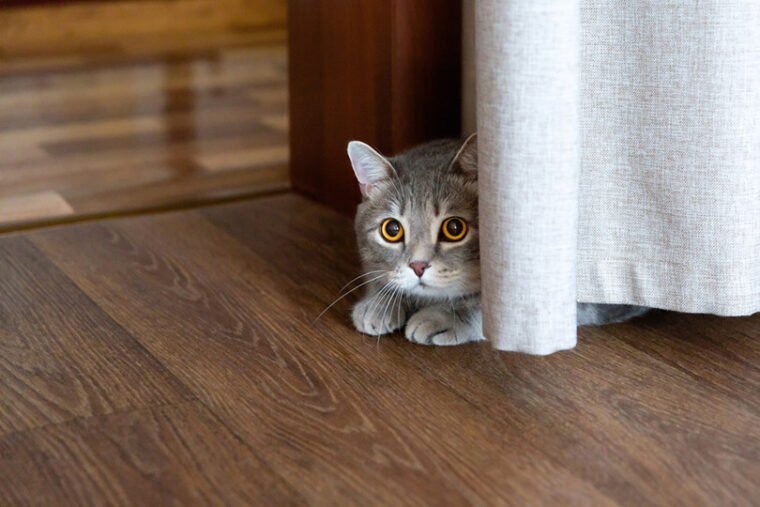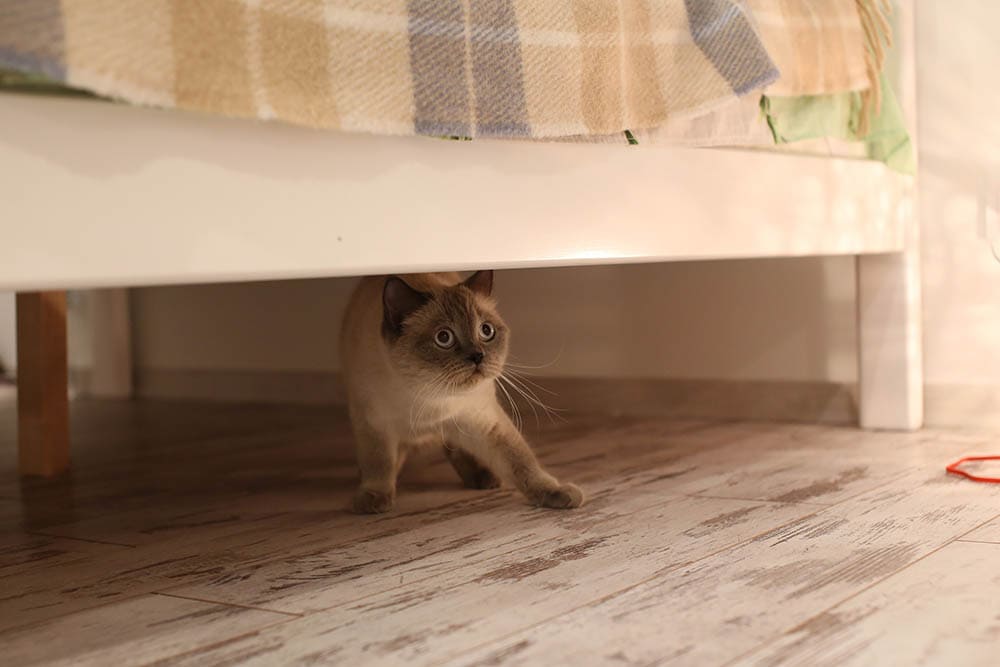
Click to Skip Ahead
Most cats are loving and affectionate creatures. They like to be petted, scratched, and played with as often as possible. It’s not uncommon for a kitty to initiate cuddling sessions or insist on being petted while napping in a sunny spot. In general, cats enjoy human contact and find it comforting. But what should you do if your feline friend suddenly seems to recoil from your touch? Read on to learn more about why your cat might no longer want to be touched and what you can do about it.
The 6 Reasons Why Your Cat Doesn’t Want to be Touched
1. Your Cat Is Uncomfortable or in Pain
Just like with humans, cats in pain are more likely to avoid being touched.
If your kitty has always been a personable creature that is happy to be handled but suddenly acts skittish and tries to avoid being touched, it could be a sign that they are in pain. For example, cats that have recently undergone surgery, have been injured in some way, or have a chronic condition like arthritis will be reluctant to let you pick them up, pet them, or even brush them. They may be trying to tell you that they need extra care.
Therefore, if you notice your cat exhibiting any of these behaviors, speak with your veterinarian. Your vet may be able to prescribe medication or show you how to perform at-home care that can help ease your cat’s pain and make them more comfortable.

2. Your Cat Could Be Sick
If your cat has been a frequent guest on your lap but suddenly shies away from you, it means something isn’t right. Cats with illnesses like urinary tract disease, dental issues, or even cancer may be experiencing sudden pain that is difficult for them to communicate. If your kitty has been displaying other symptoms, like lethargy, diarrhea, vomiting, or increased thirst, it’s a good idea to have them checked out by a vet.
Even if your cat doesn’t seem to be in pain right now, it could be a symptom of something serious that needs immediate attention. Behavioral changes like these could also indicate a health problem:
3. There’s A New Smell in the House
Cats are extremely sensitive to scents and might not want to be touched if there’s a new scent in the house. If you’ve recently had friends over, been cleaning excessively, or brought home a new pet, your cat might not want to be touched because of these strange new odors.

4. Your Cat Wants to Be Left Alone
It may sound strange but kitties have bad days too.
Cats are known to be extremely sensitive to their environment, and sometimes they just want to be left in peace. Your cat may not be sick or in pain or have any problem areas, but they may simply not want to be touched right now. It’s important to respect your cat’s boundaries. If your kitty is showing signs of discomfort or goes into a defensive posture, like hissing or swiping at you, it’s best to back off for the time being. Most cats will let you know when they want to be cuddled again.
In short, if your kitty previously loved being petted, but they suddenly don’t now and there doesn’t seem to be anything wrong with them, it could be a sign that they just need to unwind for a little while.
5. Your Cat Might Be Scared
If your cat has never been a fan of being touched but one day, suddenly starts to really dislike it, there is a good chance that something has scared them. Cats are often reluctant to show any sign of weakness; as such, they may go to great lengths to hide any kind of anxiety or fear from you. Something as small as you arguing in the house, a visitor stopping by, or any other significant change being made in the environment could have spooked your cat and left them unwilling to be touched.

6. Your Cat Is Getting Older
It is also possible that as the years pass, your cat’s behavior changes. Although your adorable feline used to enjoy your petting, they may not appreciate these displays of affection as much as they get older (and maybe they’ve gotten grumpier too!). However, have your veterinarian check your cat to ensure that this behavior change is not caused by cognitive dysfunction, such as dementia.
What to Do If Your Cat Doesn’t Want to Be Touched

If your cat no longer wants to be touched, you should start by taking them to the vet. Several things could be going on that are causing your cat to no longer want to be touched. A few of these are serious but can be treated if caught early enough. Cats are used to hiding anything that is wrong with them, so it is always better to rule out anything serious.
Conclusion
It can be frustrating if your cat has suddenly gone from being a lap cat to avoiding your touch. However, there are many reasons that a cat may react this way. If your furry friend seems to be in pain or doesn’t want to be touched at all, it’s essential to speak with a veterinarian to rule out any health issues. Indeed, a change in a cat’s behavior toward being touched, petted, or stroked can signify that something more serious is going on with your cat.
That said, if your cat is stressed and simply doesn’t want to be cuddled for a little while, they’ll likely let you know when they’re ready to be petted again. With a bit of patience and understanding, you can help your cat feel more comfortable again.
Featured Image Credit: Mantikorra, Shutterstock







